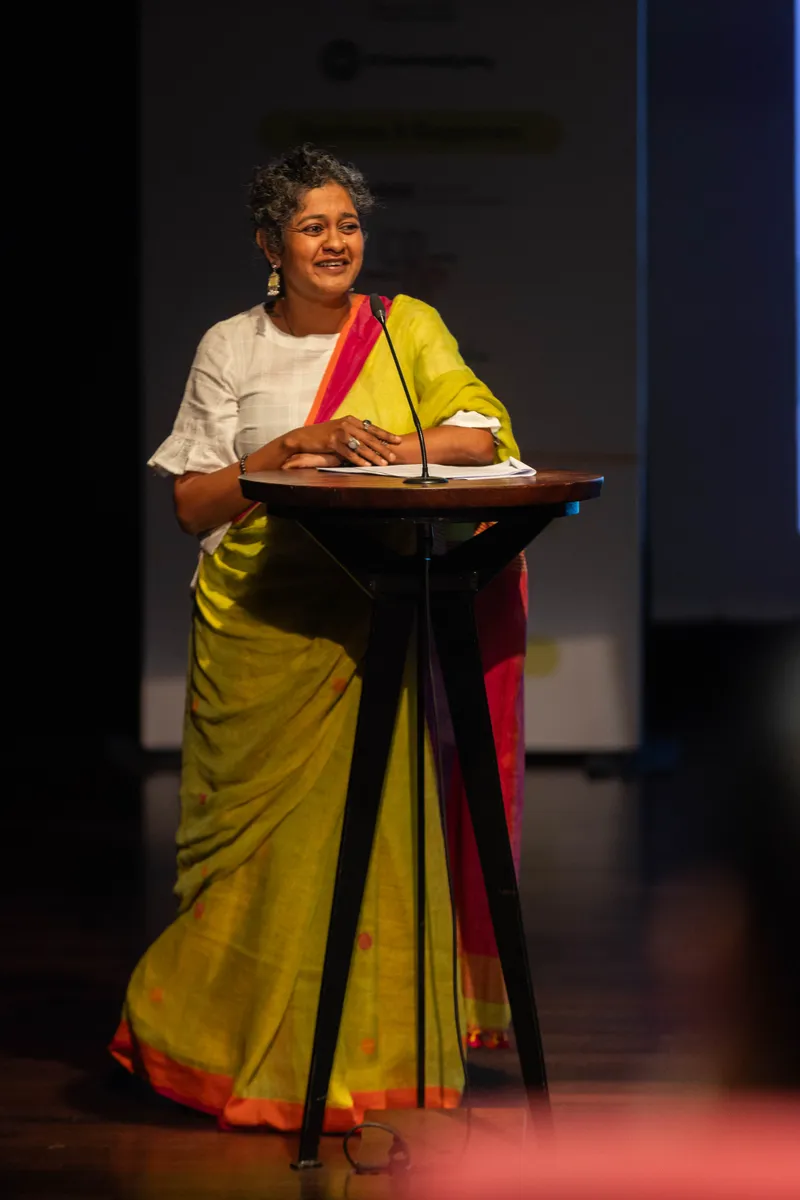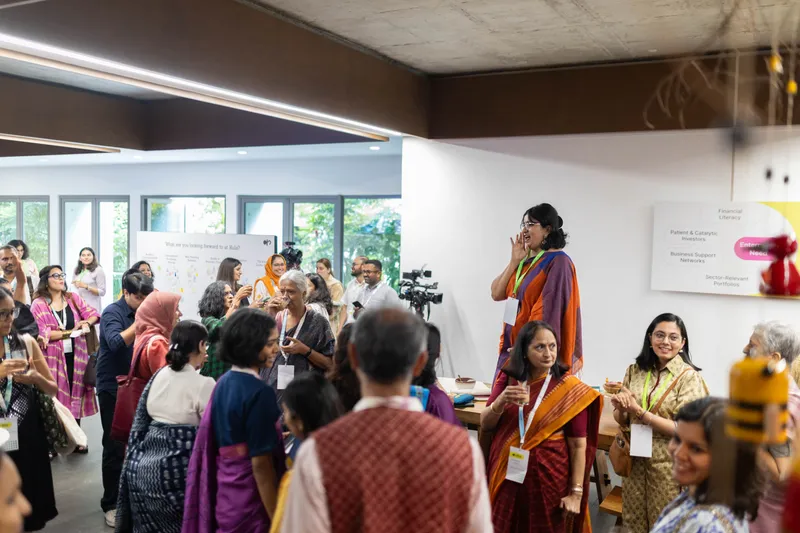200 Million Artisans is unlocking ‘handmade in India’ by supporting craft-led enterprises
Priya Krishnamoorthy started 200 Million Artisans to empower craft-led enterprises through knowledge, networks, and capital. The second edition of its Kula Conclave will bring together 250+ changemakers and facilitate partnerships between creative-cultural businesses, investors, and policymakers.
After a decade in broadcast journalism, Priya Krishnamoorthy began to question if her storytelling still carried the spark that first led her to pursue journalism. Was she truly making a difference or simply telling stories?
“When I set out to be a journalist, I wanted storytelling to make a difference. By the time I ended my media career, I was writing promos. I was asking myself, “Why am I doing this?’” Krishnamoorthy recalls.

Priya Krishnamoorthy - Founder, 200 Million Artisans
Meanwhile, as a journalist, she saw the rise of the social impact movement in India, with social entrepreneurship coming into focus.
This epiphany would lead to Krishnamoorthy to start 200 Million Artisans in 2020—an organisation that supports people to reimagine the potential of “Handmade in India” through inclusive entrepreneurship.
200 Million Artisans is all set to launch its second Kula Conclave from December 2-4 at the Kala Academy in Goa. The networking forum bridges the gap between inclusive capital and networking in India’s creative-cultural and craft-led brands, social businesses, and startups.
Understanding art through academics
To understand the evolution of 200 Million Artisans, it’s imperative to follow Krishnamoorthy’s journey from journalism to social impact.
After quitting broadcast journalism in 2012, she reached out to universities abroad to explore creative entrepreneurship. She found the only discourse in the UK, but a university she was speaking to suggested learning more about the field in India first. She decided to look at arts management instead and joined Dakshin Chitra in Chennai.
Krishnamoorthy—on a research project in Odisha to understand how Pattachitra art learning was passed on through generations—lived with the artisan community and learned that every artisan is a storyteller, and some among the younger generation wanted their art to take different forms.
“Some of the younger kids didn’t want to regurgitate the same kind of Pattachitra we have been seeing on walls. Some parents were also blocking the kids from learning it, even if they were interested. For them, there was no future for their kids if they became artisans,” she explains.
After completing the project, Krishnamoorthy returned to Mumbai and worked at Artisans—a gallery in Kala Ghoda—to understand more about enterprises working with artisans. Every artisan and entrepreneur taught her about the business of handmade in several ways.
“But they were all struggling to scale, didn’t have a community, didn’t know where to look for money, or how to scale their business because they were creative people first and entrepreneurs later. So, where is the community for creative people?” she pondered.
Krishnamoorthy sought answers in academics once again, applying and receiving a Fulbright scholarship for a Master’s at Boston University. This time, she had a clear focus—how to build ecosystems for creative enterprises.
At BU, she helped creative entrepreneurs apply for the accelerator programme, and after that, she worked with MIT Solve—a global accelerator incubator when the COVID-19 pandemic hit the world.
“A lot of communities I had been in touch with in India—craft communities and entrepreneurs—started reaching out, saying they couldn’t pay their artisans because they had no sales. They asked for help with fundraising. I would help out,” she says.
Research for unlocking potential

Kula Conclave 2023
200 Million Artisans started with a spreadsheet, where Krishnamoorthy listed the legit organisations raising money. “I had just written an article talking about why we need to build an ecosystem for creative and cultural entrepreneurs. I highlighted a data point saying while official figures put Indian artisans somewhere between 7-25 million, unofficially, there are 200 million artisans,” she says.
Using this, she created a website for 200 Million Artisans with a list of fundraisers. Soon, volunteers reached out and built a remote community.
A small research project led to the creation of the Business of Handmade (BoH)—a dedicated platform to drive research, insights, and storytelling. BoH has delivered critically acclaimed research projects like Informality and Catalytic Capital using a craft-enterprise lens.
Last year, it released the second edition of BoH, with insights from 70+ investors, funders, ecosystem actors, and enterprises working in India’s handmade economy. It mapped the unique characteristics and financing needs of 516 craft-led, mostly for-profit MSMEs as part of a pan-India survey.
In 2023, 200 Million Artisans organised the first edition of Kula Conclave, an invite-only networking forum. “It would include investors, funders, or any kind of a capital provider, a foundation, or a debt or equity investor, or incubator giving money to folks interested in wanting to support the craft sector and its enterprises,” she elaborates.
Bridging the gap
This year, the Kula Conclave will facilitate collaborations between 250+ changemakers across India, committed to reimagining the potential of India’s creative manufacturing and handmade (CMH) sector, says Krishnamoorthy.
It is co-designed with a community of over 20 stakeholders, including founders of organisations and craft-led brands like P-TAL, Brown Living, Kadam Haat, Urvashi Kaur, MeMeraki, Desi Hangover, Material Library of India, Fashion Revolution India, Karghewale, Indian Institute of Crafts and Design, Breakaway Journeys, Somaiya Kala Vidya, Varnam Craft Collective.
A diverse community of investors like Artha Impact (Rianta Capital, Zurich), Beyond Capital Ventures, HCL Foundation, Upaya Social Ventures, Tata Trusts, and GetVantage will also be present at the event.
“The aim is to give investors a spectrum of what is happening in the sector by driving conversations on a variety of topics, whether it’s climate-positive material, AI, or media that works with craft communities through storytelling and data,” she explains.
Kula Conclave 2024 will also see the launch of Kula Innovate—an initiative that addresses the R&D gap that impacts 80% of craft-led enterprises in the CMH sector.
Launched in August this year, the open innovation challenge has already received 175 applications and raised Rs 1.3 crore through strategic partnerships. The winners will be awarded cash prizes.
Krishnamoorthy admits 200 Million Artisans wouldn’t have evolved if not for the kindness of strangers and the support it has received from volunteers.
“We want to scale the organisation but grow organically and serve communities and countries in South Asia because our cultures are similar,” she concludes.
(Details of registration for Kula Conclave are available here.)
Edited by Suman Singh






